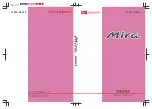
BREAKING-IN
You need to break in new tires for
approximately 300 miles (480
kilometers). During this time, your vehicle
may exhibit some unusual driving
characteristics.
Avoid driving too fast during the first 1000
miles (1600 kilometers). Vary your speed
frequently and change up through the
gears early. Do not labor the engine.
Do not tow during the first 1000 miles
(1600 kilometers).
ECONOMICAL DRIVING
Fuel economy is affected by several things
such as how you drive, the conditions you
drive under and how you maintain your
vehicle.
There are some things to keep in mind that
may improve your fuel economy:
•
Accelerate and slow down in a smooth,
moderate fashion.
•
Drive at steady speeds.
•
Anticipate stops; slowing down may
eliminate the need to stop.
•
Combine errands and minimize
stop-and-go driving.
•
When running errands, go to the
furthest destination first and then
work your way back home.
•
Close the windows for high-speed
driving.
•
Drive at reasonable speeds. (Traveling
at 65 mph/105 kph uses about 15%
less fuel than traveling at 75 mph/121
kph).
•
Keep the tires properly inflated and use
only the recommended size.
•
Use the recommended engine oil.
•
Perform all regularly scheduled
maintenance.
There are also some things you may want
to avoid doing because they reduce your
fuel economy:
•
Avoid sudden or hard accelerations.
•
Avoid revving the engine before turning
off the car.
•
Avoid long idle periods.
•
Do not warm up your vehicle on cold
mornings.
•
Reduce the use of air conditioning and
heat.
•
Avoid using speed control in hilly
terrain.
•
Do not rest your foot on the brake
pedal while driving.
•
Avoid carrying unnecessary weight
(approximately 1 mpg [0.4
kilometers/liter] is lost for every 400
lbs [180 kilograms] of weight carried).
•
Avoid adding particular accessories to
your vehicle (e.g. bug deflectors,
rollbars/light bars, running boards, ski
racks).
•
Avoid driving with the wheels out of
alignment.
DRIVING THROUGH WATER
Note:
Driving through deep water above
the recommended levels can cause vehicle
damage.
If driving through deep or standing water
is unavoidable, proceed very slowly. Never
drive through water that is higher than the
bottom of the wheel rims (for cars) or the
bottom of the hubs (for trucks).
218
Fusion/Mondeo (CC7)
Driving Hints
















































